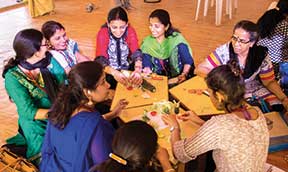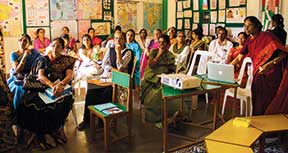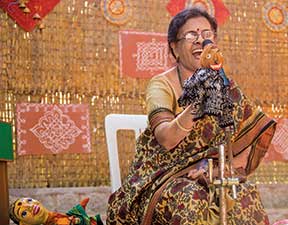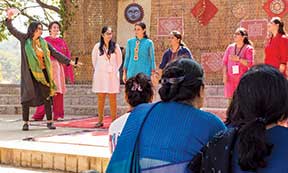Ankita Rajasekharan
 A curriculum grounded in love, acceptance, security, discipline, individuality, and praise is not unfamiliar to the education system. These have made for the core framework of schooling and education since the start of education, believed the organizers of the National Symposium. However, over time, these ideas have been overpowered by performance, academic pressure, and competition. In response to this, a number of schools and learning spaces have been sprouting up under the umbrella of alternate methods in schooling and learning; an otherwise natural frame of curriculum is now understood as an alternative frame.
A curriculum grounded in love, acceptance, security, discipline, individuality, and praise is not unfamiliar to the education system. These have made for the core framework of schooling and education since the start of education, believed the organizers of the National Symposium. However, over time, these ideas have been overpowered by performance, academic pressure, and competition. In response to this, a number of schools and learning spaces have been sprouting up under the umbrella of alternate methods in schooling and learning; an otherwise natural frame of curriculum is now understood as an alternative frame.
Sri Aurobindo International School, along with Aditi Gurukula and New Creation School organized a two day National Symposium in an attempt to familiarize, understand, and share these alternative and innovative ideas and methods in schooling and learning. The symposium was also a celebration of Sri Aurobindo International School having completed 50 years. The two-day symposium was organized in the lush and pleasant campus of a recent addition to the Matri Darshan Trust, the New Creation School. Over 40 different schools, institutions, groups, and individuals involved in thinking about and working with education took part in the symposium as both speakers and listeners. Participants represented a variety of schools of thought and also geographical and cultural groups.
 Much of the symposium was designed around presentations and discussions. A few sessions were presented individually and all the participants could attend them. Afternoon sessions were parallel, three sessions at a given point of time and the participants could choose to attend any one. Schools/individuals presented their ideas, experiences and practices which paved the way for discussions, questions, and reflections. The New Creation School and Sri Aurobindo International School also set up model classrooms that one could walk around in and observe the kind of educational aids and learning materials used by them and also samples of children’s work, etc. Teachers were available to clarify or discuss ideas and questions regarding the same.
Much of the symposium was designed around presentations and discussions. A few sessions were presented individually and all the participants could attend them. Afternoon sessions were parallel, three sessions at a given point of time and the participants could choose to attend any one. Schools/individuals presented their ideas, experiences and practices which paved the way for discussions, questions, and reflections. The New Creation School and Sri Aurobindo International School also set up model classrooms that one could walk around in and observe the kind of educational aids and learning materials used by them and also samples of children’s work, etc. Teachers were available to clarify or discuss ideas and questions regarding the same.
Among the many who presented at the symposium were – Ananda Reddy (SACAR), Praveen Kumar (IPS), Prema Rangachary (Vidya Vanam School), Deepa Avashia (The Riverside School), Rashi Bunny (Banjara Theatre Group), Ratnamala Nori (Nori Art and Puppetry Centre), Rammohan Holagundi (Nishumbita), Neeraja Raghavan (Thinking Teacher), Aruma Raghavan (BeMe).
Ideas, thoughts and reflections
The child being at the core of the entire philosophy and thought in education is based on the expectation that the child is a highly participative individual in the entire process of schooling and learning. It demands that the child be involved critically in planning and organizing one’s time in school. Many individuals and schools at the symposium supported and shared experiences of the wonderful depth and meaning that schooling came to find once the child is an active participant. BeMe School from Bangalore, highly inspired by The Summerhill School (an alternative school in Suffolk, United Kingdom) went a step ahead and stated that the adults were as much co-learners as the children themselves. Regular school meetings where ideas, suggestions or issues regarding the school are put forward, by a child or an adult are voted for or against; everyone’s vote having the same weight, irrespective of age, sex, role in school. This meant that the school was simply a space where individuals, child and adult, came together and spent time exploring and learning what interests one. This also meant that the onus was not solely on the adult to have all the answers or skills; help and sharing of knowledge spilled beyond the walls and people in school. There will always be a question that none in school has an expertise to answer with as much gusto as the questioner; one with expertise is then sought, be it an adult beyond the teacher group, be it a parent, a friend, anyone who shares the same enthusiasm about the subject in question!
 Riverside School shared how empowering the child with a voice and the power of choice changed the entire dynamics of schooling. The first time is always the most difficult and of course every new batch brings with it, its own challenge with working democratically, but the journey is worth it, for the adult as much as the child. “Children are not the future, they are the now,” is what drives the idea of ensuring that every child is consulted in his/her growth and experience at school. A seemingly simple statement but when looked at deeply, it is a profound and powerful thought. A lot of schooling is guided by the idea of ensuring a ‘safe and comfortable future’ to the child; exams and curriculum are justified by the good that they will do to the child in the future. Once schooling becomes meaningful for the ‘now’ of the child, all of the curriculum will see a drastic change. Curriculum will no longer be about what will be useful for the tenth board exams!! It will be about what is exciting the child ‘now’, what is inspiring and motivating the child ‘now’ and is he/she able to find the space to express and explore that interest; both of which will only happen in a space that is democratic and supportive of the child’s individuality.
Riverside School shared how empowering the child with a voice and the power of choice changed the entire dynamics of schooling. The first time is always the most difficult and of course every new batch brings with it, its own challenge with working democratically, but the journey is worth it, for the adult as much as the child. “Children are not the future, they are the now,” is what drives the idea of ensuring that every child is consulted in his/her growth and experience at school. A seemingly simple statement but when looked at deeply, it is a profound and powerful thought. A lot of schooling is guided by the idea of ensuring a ‘safe and comfortable future’ to the child; exams and curriculum are justified by the good that they will do to the child in the future. Once schooling becomes meaningful for the ‘now’ of the child, all of the curriculum will see a drastic change. Curriculum will no longer be about what will be useful for the tenth board exams!! It will be about what is exciting the child ‘now’, what is inspiring and motivating the child ‘now’ and is he/she able to find the space to express and explore that interest; both of which will only happen in a space that is democratic and supportive of the child’s individuality.
While each individual is unique, creative, and individualistic in one’s pursuits, inspirations, and motivations, each individual also comes with a baggage of one’s culture, community and the history of one’s community. ‘Baggage’ is not a negative aspect here, it is just something that weighs on every individual and must be acknowledged. It does not make much sense to learn about the forest in a book while the school itself is in a forest, does it? While the culture of literacy and learning from books is an effective one, when one has the content of the book in real at one’s disposal, the book is redundant, isn’t it? One would just have to leap out and embrace what the surrounding of the school and child has to provide. Vidya Vanam in Anaikatti does that! They don’t work with books as the only source or even as the source at all, until much, much later in the education process. Schooling is equivalent to exploring the forest and what the forest and the people of the forest have to offer. They spoke of a song that the community sang that listed out 25 varieties of spinach that grew in the fields! That teaching is necessary for learning to happen is a flawed assumption; a sense of wonder in the child, that is the start of the learning! And wonder does not require teaching; it comes from just observation and exploration. The sense of wonder brings with it a thirst to sustain that wonder, to find answers that lead to more questions. Substituting that experience by the word, in a way, concludes the thought itself, it breaks the flow of that insistent mind chatter and amusement. This is not to say that the written word offers no inspiration but that, the written word is not the only resource for learning and that the context of the learner and the learning must be taken into account while choosing the resource for that learning.
 Further is a deeper question of once the resources for learning are chosen, which resources are given greater time and importance. It is no shocker that a lot of schooling focuses on strengthening academic pursuits, because that is what builds toward a ‘safe and comfortable future’, except for the very few sports persons, dancers, musicians, or artists who are required to pursue these interests outside of schooling. Not many schools are brave enough to decide and stick to the decision that all subjects are equally important; that the performing arts, mathematics, literature, science, arts, physical sports, gymnastics, all stand equal importance; that no one subject deserves more importance, that no subject can be substituted for. The Peepul Grove school believes strongly in this ideology and tries to ensure that the child is able to pursue and sharpen its skill and understanding of all subjects. This does not necessitate that every child masters every subject and skill equally but that the child is given the opportunity to explore each one with as much enthusiasm, that the child does not grow up believing some activities are for later when there is leisure and time to spare. This again comes with believing that education is not about the future, it is not about achieving something in the years to come but that education is about the experience of now, that education is not about landing a well-paid job but that it is a coming together of experiences and skills that make the individual what he/she is. It is, in essence, detached from the need to feed into the working economy of the country, being able to find a space in the economy and finding a pursuit exciting enough to earn a living from is a by-product of education, not the aim of education.
Further is a deeper question of once the resources for learning are chosen, which resources are given greater time and importance. It is no shocker that a lot of schooling focuses on strengthening academic pursuits, because that is what builds toward a ‘safe and comfortable future’, except for the very few sports persons, dancers, musicians, or artists who are required to pursue these interests outside of schooling. Not many schools are brave enough to decide and stick to the decision that all subjects are equally important; that the performing arts, mathematics, literature, science, arts, physical sports, gymnastics, all stand equal importance; that no one subject deserves more importance, that no subject can be substituted for. The Peepul Grove school believes strongly in this ideology and tries to ensure that the child is able to pursue and sharpen its skill and understanding of all subjects. This does not necessitate that every child masters every subject and skill equally but that the child is given the opportunity to explore each one with as much enthusiasm, that the child does not grow up believing some activities are for later when there is leisure and time to spare. This again comes with believing that education is not about the future, it is not about achieving something in the years to come but that education is about the experience of now, that education is not about landing a well-paid job but that it is a coming together of experiences and skills that make the individual what he/she is. It is, in essence, detached from the need to feed into the working economy of the country, being able to find a space in the economy and finding a pursuit exciting enough to earn a living from is a by-product of education, not the aim of education.
The classroom is a democratic space in which a child and adult spend a great many hours of the day following interests, pursuing questions with passion and rigour, unbound by resource or time frames. Working for and towards this model of schooling seemed to be the highlight and energy left behind for me, from the people I interacted with and the sessions that I chose to attend.
The author is currently working as a facilitator at Shriram Montessori School, Hyderabad. She can be reached at 27.ankita@gmail.com.
